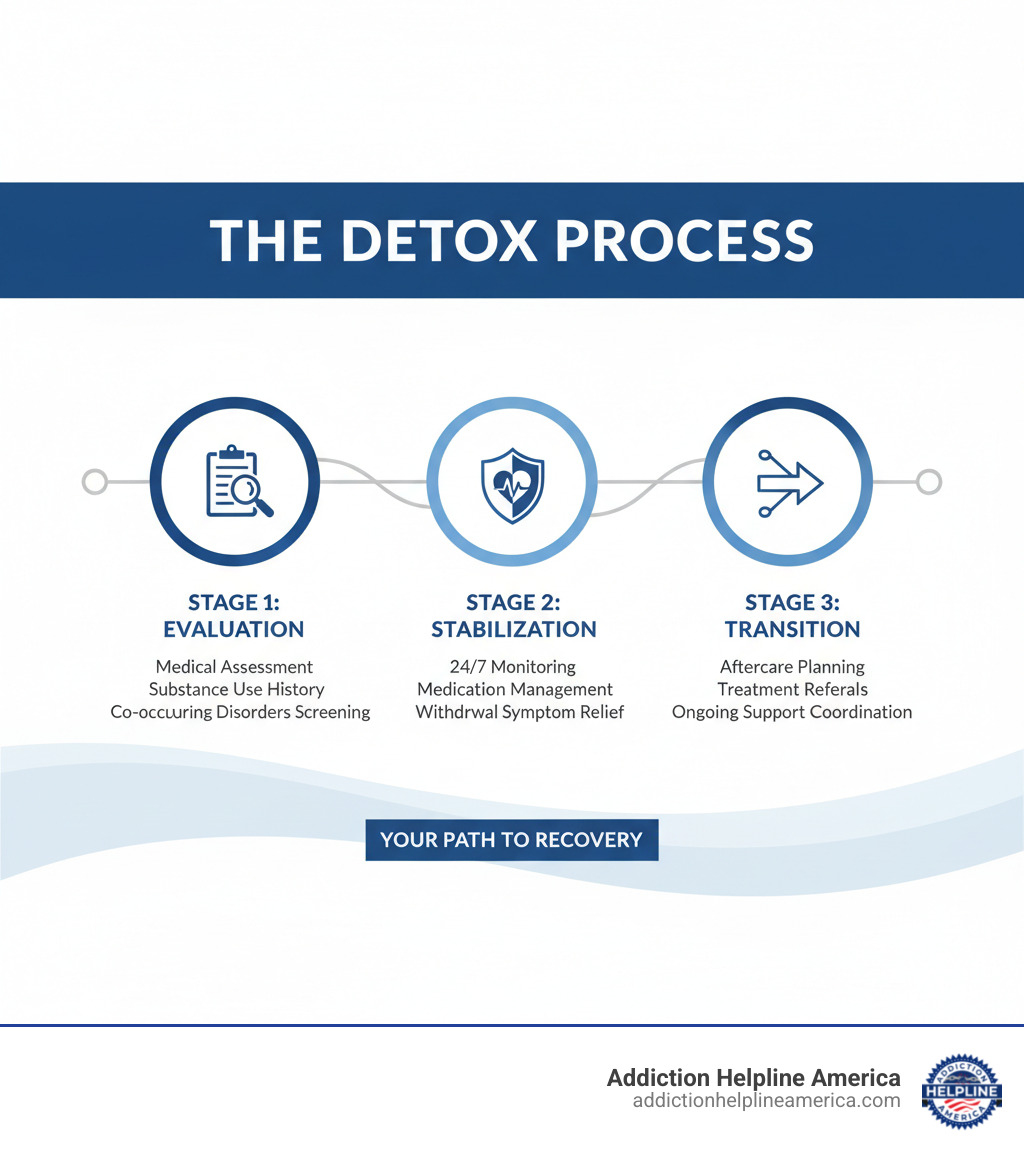
Finding Help for Addiction Recovery: Your Complete Guide to Detox Clinics
If you’re searching for a detox clinic near me, here are three critical things to know:
- What they do: Detox clinics offer medically supervised withdrawal from substances like alcohol, opioids, and other drugs in a safe, controlled environment.
- How to find one: Contact your insurance provider for in-network facilities or call our helpline for free, confidential guidance in finding a reputable clinic.
- What to expect: Most programs last 3-10 days and include 24/7 medical supervision, medication to ease withdrawal, and a plan for ongoing treatment.
Detox is the essential first step in recovery. It clears your body of harmful substances while managing the uncomfortable and often dangerous withdrawal symptoms. For substances like alcohol, opioids, and benzodiazepines, attempting to detox without medical supervision can be life-threatening.
Detox clinics stabilize your physical and mental health with around-the-clock care from medical professionals. They monitor vital signs, administer medication, and provide emotional support, counseling, and a detailed plan for continuing your recovery after detox ends.
At Addiction Helpline America, we connect individuals and families with the right detox clinic and comprehensive addiction treatment resources nationwide. Our team understands the urgency of finding immediate, compassionate care. This guide will walk you through everything you need to know about starting your journey.

Relevant articles related to detox clinic near me:
What is a Detox Clinic and Why is it Necessary?
A detox clinic is a specialized medical facility where you can safely withdraw from addictive substances under the care of trained professionals. It’s a safe harbor during the storm of withdrawal, giving your body a chance to clear out harmful substances while staff manage your symptoms.
For many substances, professional detox isn’t just beneficial—it’s necessary for your safety. Alcohol, opioids, and benzodiazepines create such strong physical dependence that stopping suddenly can trigger life-threatening withdrawal symptoms. A detox clinic provides a stable foundation for recovery. Without clearing your mind and body, engaging in therapy and building new coping skills is incredibly difficult. At Addiction Helpline America, we can guide you to the resources that make recovery a reality. You can learn more about this vital process on our page about the Detoxification Process.

Signs You or a Loved One Needs Professional Detox
Recognizing the need for help is an act of strength. Here are key indicators:
- Physical dependence: Experiencing withdrawal symptoms like nausea, tremors, sweating, or seizures when you cut back or stop.
- Unsuccessful attempts to quit: A pattern of trying to stop on your own but being overwhelmed by withdrawal or cravings.
- Worsening mental health: Increased anxiety, depression, paranoia, or psychosis linked to substance use.
- Risky substance use: Driving while impaired, using in dangerous situations, or mixing substances.
- Experiencing withdrawal symptoms: If you already feel withdrawal when you try to stop, it’s an urgent sign that medical supervision is essential.
- Co-occurring disorders: Having a mental health condition like depression, anxiety, or PTSD alongside addiction requires integrated care.
If these signs are familiar, professional help is available. Taking the step to Get Professional Help can change your life.
Call Now – Your Journey to Recovery Begins Today!

Take the first step towards a healthier life! Call now to connect with our compassionate team and start your recovery journey today. Your path to healing awaits!
Our recovery specialists are available 24/7 to provide support, and all calls are confidential and free. Reach out anytime – we’re here to help!
Services Offered at a Detox Center
A quality detox program provides comprehensive support:
- Medical evaluation: A thorough assessment of your medical history and substance use to create a personalized detox plan.
- 24/7 monitoring: Constant supervision by medical staff to ensure your safety and respond to any complications.
- Medication management: Prescription medications to ease withdrawal symptoms and prevent dangerous complications.
- Individual and group counseling: Early opportunities to process emotions and connect with peers who understand your struggle.
- Aftercare planning: A comprehensive roadmap for your next steps in recovery, such as inpatient or outpatient rehab.
For more on the therapeutic aspects of recovery, see our Best Counseling for Addiction Guide.
Common Substances Requiring Professional Detox
Withdrawal from these substances carries high risks, making medical supervision essential:
- Alcohol: Withdrawal can escalate to hallucinations, seizures, and delirium tremens (DTs), a potentially fatal condition.
- Opioids: While rarely fatal, withdrawal from heroin, fentanyl, or painkillers is profoundly uncomfortable and often unbearable without medical support to manage symptoms and cravings.
- Benzodiazepines: Similar to alcohol, sudden cessation of drugs like Klonopin or Xanax can cause life-threatening seizures. A medically supervised taper is critical. For more, see our Klonopin Treatment page.
- Barbiturates and sedatives: These also require careful medical management to prevent severe neurological complications like seizures.
- Stimulants: Withdrawal from cocaine or meth can trigger severe depression, intense cravings, and psychosis, making relapse likely without professional support. Learn more about Cocaine Addiction Treatment.
Attempting to detox from these substances at home is risky. A professional detox clinic near me provides the safe start you need.
Types of Detox Programs: Inpatient vs. Outpatient
When you’re ready for recovery, you’ll need to choose between inpatient and outpatient detox. The best option depends on the severity of your addiction, your health, and your home support system. At Addiction Helpline America, we can help you steer this decision.
Here’s a comparison of inpatient and outpatient detox programs:
| Feature | Inpatient Medical Detox | Outpatient Detox Programs |
|---|---|---|
| Supervision Level | 24/7 medical and clinical supervision | Regular medical check-ups and therapy sessions; return home daily |
| Environment | Structured, residential, removed from triggers | Home environment, allows maintenance of daily routines |
| Cost | Generally higher due to residential stay and intensive care | Generally lower, as no overnight stay is required |
| Ideal Candidate | Severe dependence, high risk of severe withdrawal, unstable home environment, co-occurring mental health issues | Relatively recent or less severe addictions, strong home support, stable mental health |
| Safety | Highest level of safety, constant medical intervention | Good for low-risk withdrawal, but less immediate medical response |
Inpatient Medical Detox
Inpatient detox offers the safest, most comprehensive care, especially for severe dependence on alcohol, benzodiazepines, or opioids. You live at the facility 24/7 with constant access to medical professionals. This structured environment removes you from daily triggers and stressors, allowing you to focus entirely on healing. We recommend inpatient detox if you have a severe dependence, have experienced dangerous withdrawal symptoms in the past, or lack a supportive home environment. For more on treatment settings, see our guide on Drug Rehab vs. Inpatient vs. Outpatient.
Call Now – Your Journey to Recovery Begins Today!

Take the first step towards a healthier life! Call now to connect with our compassionate team and start your recovery journey today. Your path to healing awaits!
Our recovery specialists are available 24/7 to provide support, and all calls are confidential and free. Reach out anytime – we’re here to help!
Outpatient Detox Programs
Outpatient detox allows you to receive treatment during scheduled appointments while returning home each evening. This flexibility is ideal if you have work or family commitments you can’t leave. It works best for people with less severe addictions, a strong support system at home, and good overall health. You get professional medical support while maintaining your daily life, and the cost is typically lower than inpatient care. We can help you find an outpatient detox clinic near me that fits your circumstances.

Short-Term Detox Programs
Short-term programs, typically lasting 3, 5, or 7 days, focus on acute stabilization. They provide intensive medical management to get you safely through the most dangerous phase of withdrawal. Short-term detox is not a complete treatment for addiction; it is only the first step. A reputable program will include comprehensive transition planning to guide you to the next stage of recovery, such as an inpatient or outpatient program. For information on longer programs, our 30 Day Inpatient Rehab Hillsborough Guide offers helpful details.
The Detox Journey: What to Expect
Knowing what to expect can ease the anxiety of starting detox. The journey at a detox clinic near me typically unfolds in four phases designed to guide you from active addiction to the start of recovery.
- Admission: You’ll complete paperwork and have an initial consultation so the staff can understand your immediate needs.
- Medical Assessment: A healthcare team conducts a thorough physical and mental health evaluation, including your substance use history, to create a safe, personalized detox plan.
- Withdrawal Management: This is the core of detox. You’ll receive 24/7 monitoring and medications as needed to manage withdrawal symptoms in a calm, supportive environment.
- Transition Planning: As you stabilize, the team works with you to create a roadmap for what comes next, whether it’s inpatient rehab or outpatient therapy. This ensures detox is the first chapter, not the whole story.
For a detailed look at each step, explore The full Detoxification Process on our site.

Managing Withdrawal Symptoms and Medical Support
Facing withdrawal is challenging, which is why medical support is essential. Symptoms can be both physical (nausea, tremors, sweating, seizures) and psychological (intense cravings, anxiety, depression, insomnia). Medical staff monitor your vital signs around the clock to keep you safe and as comfortable as possible.
Medication Assisted Treatment (MAT) is a key tool, especially for opioid and alcohol withdrawal. Medications like buprenorphine and methadone reduce cravings and ease symptoms, stabilizing brain chemistry so you can focus on recovery. These are not a replacement for addiction but a medical intervention to support it. When combined with counseling, MAT dramatically improves outcomes. Learn more about Medication Assisted Treatment (MAT). For additional guidance and immediate support, consult the SAMHSA National Helpline.
Complementary Therapies in Detox
Modern detox facilities address more than just physical health. These complementary therapies work alongside medical care to support your overall well-being:
- Individual and Group Therapy: Start processing the emotions of addiction and connect with peers in a safe space. Explore options on our Therapy page.
- Nutritional Support: Healthy, balanced meals help restore physical health and boost energy levels.
- Yoga and Meditation: These practices reduce stress, improve sleep, and teach mindfulness skills to manage cravings.
- Trauma-Informed Therapy: For those with underlying trauma, this approach ensures care is delivered in a way that supports healing from past wounds. Learn more about Trauma Informed Therapy.
These therapies create a more compassionate environment, setting a stronger foundation for lasting recovery.
How to Find a Detox Clinic Near Me
When you’re ready to take the first step, finding the right detox clinic near me is crucial. It’s about matching your unique needs with the right level of care. At Addiction Helpline America, we simplify this journey with free, confidential guidance.
We work with a network of treatment centers across all 50 states and D.C. Our team can help you find a reputable facility that’s right for your situation. For more insights, our Find Drug Rehab Center Guide is an excellent resource.
Steps to Find a Reputable Detox Clinic Near Me
Follow these steps to find a quality clinic:
- Consult your doctor: Your primary care physician can be a great resource for referrals based on your health needs.
- Verify licensing and accreditation: A reputable clinic must be licensed by the state. Look for accreditation from The Joint Commission (JCAHO) or CARF, which signals high standards of care.
- Read reviews: Testimonials from former patients can offer insight into a clinic’s environment and professionalism. Look for patterns in the feedback.
- Match expertise to your needs: Ensure the facility specializes in the substance you need help with and can address any co-occurring mental health issues.
- Use trusted resources: Our team at Addiction Helpline America provides personalized guidance at no cost to connect you with vetted facilities.
Understanding the Cost of Detox and Insurance Coverage
The cost of detox varies based on the program type (inpatient vs. outpatient), duration, location, and amenities. The good news is that most insurance plans cover at least some of the cost of detox. The Affordable Care Act classifies substance use disorder services as essential health benefits.
Verifying your benefits is a critical step. We can help you understand your policy’s deductibles, co-pays, and what’s covered. If insurance doesn’t cover everything, many facilities offer payment plans or sliding-scale fees. State-funded and non-profit options may also be available. For more details, see our pages on How Much Does Rehab Cost? and our Free Addiction Recovery Programs Guide.
Questions to Ask a Potential Detox Clinic Near Me
When speaking with a potential clinic, ask these questions to make an informed decision:
- What accreditations do you hold? (Look for state licensing and JCAHO or CARF.)
- What is the staff-to-patient ratio? (A lower ratio means more individual attention.)
- Do you create personalized aftercare plans? (Ensures a smooth transition to the next stage of recovery.)
- What types of therapy are included during detox?
- Do you offer Medication-Assisted Treatment (MAT)? (Crucial for opioid or alcohol detox.)
- What is the typical duration of your detox programs?
- Can you verify my insurance and discuss payment options? (Get a clear picture of costs upfront.)
- What is your philosophy of care? (Ensure it aligns with your values.)
A reputable facility will welcome your questions. Trust your instincts as you choose the foundation for your recovery.
Life After Detox: The Next Steps in Recovery
Completing detox is a monumental achievement, but it’s the beginning of your recovery journey, not the end. Detox addresses physical dependence, but the psychological and behavioral patterns behind addiction require ongoing attention. Continuing care is essential to prevent relapse.
The period after detox is delicate. This is when a solid plan and strong support system make all the difference. Our team at Addiction Helpline America specializes in helping you transition smoothly from a detox clinic near me into comprehensive treatment. For more on long-term recovery, our page on Overcoming Addiction in 2025 offers valuable guidance.

Transitioning to Further Treatment
After detox, the real work of addressing the root causes of addiction begins. A quality clinic will help you identify the right next step:
- Inpatient Rehabilitation: Living at a treatment center for 30-90 days provides a structured, trigger-free environment to focus on healing through intensive therapy.
- Partial Hospitalization Program (PHP): Offers a high level of care (5-6 hours a day) while allowing you to return home at night.
- Intensive Outpatient Program (IOP): Provides 9-12 hours of treatment per week, allowing you to maintain work or family responsibilities.
- Outpatient Counseling: Regular therapy sessions (once or twice a week) help you steer challenges and build on your progress.
Matching the level of care to your needs is key. Our guide on Choosing the Right Rehab Facility can help you make this decision.
The Role of Sober Living and Support Groups
Beyond formal treatment, sober living homes and support groups are invaluable for maintaining sobriety.
Sober living homes offer a drug- and alcohol-free environment where you live with peers in recovery. They provide structure, accountability, and a supportive community, bridging the gap between intensive treatment and independent living. You practice sober living skills while still having a safety net. Learn more on our Sober Living page.
Support groups provide ongoing encouragement and accountability. Twelve-step programs like Alcoholics Anonymous (AA) and Narcotics Anonymous (NA) offer a spiritual framework and strong fellowship. Non-12-step groups use evidence-based techniques like cognitive-behavioral therapy to teach practical coping skills. The common thread is connection—recovery doesn’t happen in isolation. Find the right group for you on our Addiction Recovery Support Groups page.
These resources extend the foundation built in detox and significantly improve your chances of long-term success.
Call Now – Your Journey to Recovery Begins Today!

Take the first step towards a healthier life! Call now to connect with our compassionate team and start your recovery journey today. Your path to healing awaits!
Our recovery specialists are available 24/7 to provide support, and all calls are confidential and free. Reach out anytime – we’re here to help!
Frequently Asked Questions about Detox Clinics
We know that seeking help comes with many questions. Here are clear, honest answers to the ones we hear most often.
How long does medical detox usually last?
The length of your stay at a detox clinic near me depends on the substance used, duration of use, and your overall health. Most people complete detox within 3 to 10 days, which is the typical window for acute withdrawal to subside.
However, withdrawal from long-acting substances like benzodiazepines or methadone may require a longer, slower taper over several weeks to ensure safety. Your medical team will create a timeline based on your specific needs.
Is detoxing at home safe?
No. Detoxing at home is dangerous and we strongly advise against it. For substances like alcohol and benzodiazepines, sudden withdrawal can be fatal, causing seizures, delirium tremens, or heart failure. These are medical emergencies requiring immediate professional intervention.
Even for other substances like opioids, the severe physical and psychological distress often leads to relapse. A relapse after a period of abstinence is especially dangerous, as your reduced tolerance increases the risk of a fatal overdose. A professional detox clinic provides 24/7 medical monitoring and medications to ensure your safety and comfort. It is always the safest option.
Will my insurance cover a detox program?
Yes, most insurance plans cover at least part of the cost of detox. The Affordable Care Act requires most plans to cover substance use disorder treatment. The extent of coverage depends on your specific plan, so it’s important to verify your benefits before starting treatment.
Our team at Addiction Helpline America can help you understand your coverage and out-of-pocket costs. If you lack insurance or full coverage, many facilities offer payment plans, sliding-scale fees, or can direct you to state-funded programs. Don’t let financial concerns be a barrier to getting help. Our Free Addiction Recovery Programs Guide can point you toward other resources. For state-specific cost information, see pages like How Much Does Rehab Cost in Alabama?.
Your Path to Recovery Starts Today
If you’ve read this far, you’re already taking a powerful step. Searching for a detox clinic near me is about choosing hope, health, and a future filled with possibility.
Detox is the essential first step, clearing your body under medical supervision so you can begin to heal. But detox alone isn’t enough. Lasting recovery is built in the weeks and months that follow, through continued treatment like inpatient rehab or outpatient counseling. This is where you learn the skills to build a life you don’t want to escape from.
We understand this process can feel overwhelming. At Addiction Helpline America, we offer free, confidential, and personalized guidance. We’ll help you steer our vast network of trusted treatment centers across all 50 states and D.C., verify your insurance, and find a program that matches your unique needs.
You don’t have to do this alone. The best time to start your recovery journey is now. Take the first step toward a new life by exploring your options for alcohol and drug addiction treatment. Your story can begin again with recovery.
Our helpline is 100%
free & confidential
If you or someone you care about is struggling with drug or alcohol addiction, we can help you explore your recovery options. Don’t face this challenge alone—seek support from us.
Programs
Resources
Will my insurance
cover addiction
treatment?
We're ready to help
Find the best
drug or alcohol treatment
center
Are you or a loved one struggling with addiction? Call today to speak to a treatment expert.















